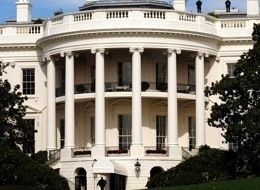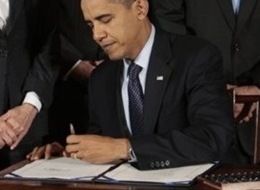Oct. 29 (Bloomberg) -- Cooper Tire & Rubber Co. is paying tariffs on imported tires. Free-trade agreements sought by Caterpillar Inc. and Wal-Mart Stores Inc. are on hold. Delta Air Lines Inc. flight attendants may join a union.
 There’s a common thread running through these developments. Organized labor is gaining momentum under the Democratic administration of President Barack Obama.
There’s a common thread running through these developments. Organized labor is gaining momentum under the Democratic administration of President Barack Obama. Though reaching their most-publicized goals -- legislation making it easier to organize and a government-run health insurance program -- remains in doubt, unions are making other gains through executive orders, rule changes and appointments. More advances may be ahead as regulatory nominees are confirmed.
“You absolutely know something is going to happen to you, you just don’t know when,” said Michael Lotito, a San Francisco attorney at Jackson Lewis LLP who handles labor issues for companies. “There is going to be a flurry of labor action down the pike.”
 Their status is a change for labor officials, who say the Republican administration of George W. Bush was hostile to their agenda. “Welcome back to the White House!” Vice President Joe Biden said to union leaders who met with the president at the White House 10 days after his inauguration.
Their status is a change for labor officials, who say the Republican administration of George W. Bush was hostile to their agenda. “Welcome back to the White House!” Vice President Joe Biden said to union leaders who met with the president at the White House 10 days after his inauguration.John Sweeney, 75, who headed the AFL-CIO for 14 years before stepping aside last month, says he was invited to the White House once during Bush’s eight years in office. That was at the request of visiting Pope Benedict XVI, he says. The AFL- CIO is the nation’s largest union group.
‘Wandering in Wilderness’
 Richard Trumka, 60, Sweeney’s successor, says he meets monthly with Obama, and that union representatives have “daily contacts throughout the administration.” Obama officials visit with labor leaders “frequently,” White House spokesman Tommy Vietor said.
Richard Trumka, 60, Sweeney’s successor, says he meets monthly with Obama, and that union representatives have “daily contacts throughout the administration.” Obama officials visit with labor leaders “frequently,” White House spokesman Tommy Vietor said.“After eight years wandering in the wilderness, unions have unprecedented access to the White House, and early directives and appointments have been encouraging for them,” said Harley Shaiken, a labor relations professor at the University of California at Berkley.
 Obama sided with the United Steelworkers last month against tire makers such as Cooper Tire and imposed 35 percent tariffs on tires imported from China. Bush rejected putting tariffs on Chinese products all four times the issue came before him.
Obama sided with the United Steelworkers last month against tire makers such as Cooper Tire and imposed 35 percent tariffs on tires imported from China. Bush rejected putting tariffs on Chinese products all four times the issue came before him.Cooper Tire
Cooper, the second-biggest U.S. tire maker after Goodyear Tire & Rubber Co., produces low-cost tires in China and opposed the tariffs. The Steelworkers argued that a surge in Chinese tires threatened U.S. jobs.
“It’s certainly been more difficult,” said Michelle Zeisloft, a spokeswoman for Findlay, Ohio-based Cooper. She declined to elaborate. Because of the tariffs, Cooper went from breaking even on imported tires to losing $14.50 on each one, according to a Sept. 21 report by JPMorgan Chase & Co.
“It’s certainly been more difficult,” said Michelle Zeisloft, a spokeswoman for Findlay, Ohio-based Cooper. She declined to elaborate. Because of the tariffs, Cooper went from breaking even on imported tires to losing $14.50 on each one, according to a Sept. 21 report by JPMorgan Chase & Co.
“This was done to support a fairly small pool of union workers,” Bill Trimarco, chief executive officer of closely held Hercules Tire & Rubber Co., also based in Findlay, said in an interview. “They won at the expense of companies like ours.”
Complaints from business about union gains are an affront to workers, said Leo Gerard, president of the United Steelworkers.
‘That’s Pablum’
“All those ‘victories’ they are talking about -- that’s pablum from those bastards,” Gerard, 62, said in an interview. “All we’re doing is standing up for jobs.”
The Steelworkers also pressed for the “Buy American” provision included in Obama’s $787 billion economic stimulus program adopted in February. Obama’s bailout of General Motors Co. and Chrysler Group LLC saved jobs of United Auto Workers members, and the International Brotherhood of Teamsters claimed victory when Congress scrapped in March a pilot program allowing Mexican trucks to deliver products in the U.S.
“Unions have accomplished a lot with the administration in less than a year,” said Clayton Boyce, a spokesman for the American Trucking Associations in Arlington, Virginia. The trade group’s members include United Parcel Service Inc., FedEx Corp. and YRC Worldwide, Inc., the biggest U.S. trucking company by sales.
(Bad) Trade Deals Stalled
 The AFL-CIO and the Teamsters also led union opposition to a pending free-trade agreement with Panama. The U.S. Trade Representative’s office dropped plans for a vote on the measure in May, saying Obama wanted first to offer a new “framework” for how trade fits into other administration programs.
The AFL-CIO and the Teamsters also led union opposition to a pending free-trade agreement with Panama. The U.S. Trade Representative’s office dropped plans for a vote on the measure in May, saying Obama wanted first to offer a new “framework” for how trade fits into other administration programs.
He has yet to do that. Behind the Panama deal in the trade queue are tentative agreements with Colombia and South Korea, supported by companies including Caterpillar and Walmart.
“We’re beyond being befuddled; we’re frustrated,” said Bill Lane, director of government affairs for Peoria, Illinois- based Caterpillar, the world’s biggest maker of construction equipment. “There is way too much focus on protectionist schemes that are intended to close the U.S. market.”
Daphne Moore, a Walmart spokeswoman, declined to comment.
The trade office “is actively working” on the agreements, spokeswoman Carol Guthrie said in an e-mailed statement. “A common misconception” is that the accords “were presented to this administration ‘sitting there with a bow tied around them ready to go,’ when in fact there is more work to be done,” she said.
Delta Elections
Delta Air Lines, the world’s largest carrier, would be more likely to lose union elections sought by flight attendants and machinists if a proposal by the AFL-CIO is approved.
The workers asked the National Mediation Board in July and August to clear the way for an election. Last month, the AFL-CIO petitioned the board to revise procedures and allow a union if most of those voting approve, instead of a majority of all workers in the class.
The board plans to announce a proposal in coming days to advance the union request on voting rules, people familiar with the matter said. Seven Republican senators said in a Sept. 30 letter that the board was delaying a decision on the union election while it considers the new vote-counting method.
The AFL-CIO request is “unbelievable,” said Robert Corker, a Tennessee senator who signed the letter. “I think big labor is going to unfortunately be given an unlevel playing field” in the Obama administration, he said in an interview.
The mediation board declined to comment.
Former Union Leader
The Obama administration in May added a former flight- attendants’ union leader to the three-person board, replacing a former lobbyist for Northwest Airlines, which is now part of Atlanta-based Delta. Another board member is a former pilot- union official.
“You have two former heads of AFL-CIO unions at the NMB and they really are politicizing the process,” Delta CEO Richard Anderson said on a conference call with investors last week.
“Our employees deserve to have union representation resolved promptly, using a process that is fair and consistent” by following existing rules, said Gina Laughlin, a Delta spokeswoman, in an e-mail. Delta is the least-unionized major U.S. airline.
First Bill
 The first bill Obama signed into law as president, nine days after taking office, was a pro-labor measure. The Lilly Ledbetter legislation, named for the woman who won a case before the U.S. Supreme Court, makes it easier to fight pay discrimination.
The first bill Obama signed into law as president, nine days after taking office, was a pro-labor measure. The Lilly Ledbetter legislation, named for the woman who won a case before the U.S. Supreme Court, makes it easier to fight pay discrimination.More bills supported by labor, stalled in past years because of White House opposition, have Obama’s support and may get the votes to pass once they get on the legislative calendar.
These include measures barring workers from getting fired because of their sexual orientation, stiffening penalties for violations of Occupational Health and Safety Administration regulations, and requiring companies to provide workers with a week of paid sick leave.
Obama also has scrapped a number of Bush rulings opposed by unions. One required federal contractors to post notices telling workers they can limit their financial support of unions. Another let contractors be reimbursed for expenses that could be used to dissuade workers from forming a union.
Business groups including the U.S. Chamber of Commerce are fighting two labor-related Obama nominees still awaiting confirmation: National Labor Relations Board member Craig Becker, an attorney for the Service Employees International Union, and OSHA director nominee David Michaels, who has written a book criticizing industry opposition to regulations.
“The failure to get some of the nominees in quickly has kept some of the agencies from moving, but once they’re in, the business community’s only recourse is litigation,” said Randy Johnson, who handles labor policy at the chamber, the nation’s largest business lobbying group.
“The failure to get some of the nominees in quickly has kept some of the agencies from moving, but once they’re in, the business community’s only recourse is litigation,” said Randy Johnson, who handles labor policy at the chamber, the nation’s largest business lobbying group.
OSHA’s acting director, Jordan Barab, signaled a new tone at the agency in a speech to the Wisconsin AFL-CIO last month. One of the first things he did when he arrived, Barab said, was to replace pictures of OSHA managers displayed in a conference room with photos of workers who had been killed on the job.
The National Mediation Board plans to make it easier for unions to organize workers at carriers including Delta Air Lines Inc., people familiar with the matter said.
The proposal, to be announced in coming days, would let workers form unions with a majority approval of those voting, according to the people, who asked not to be identified discussing the plan. The change would overturn a standard that requires support of most workers in a class, not just those who cast ballots.
The National Mediation Board helps resolve labor disputes and oversees elections for airlines and railroads under the Railway Labor Act. The three-member board, criticized by labor for actions under Republican George W. Bush’s administration, now has a Democratic majority with President Barack Obama in office.
The change would be a victory for the AFL-CIO, the largest U.S. labor federation. The group asked the National Mediation Board to overhaul the voting standard last month, saying it would be more democratic. “It’s been our sincere hope that the National Mediation Board would look at our recommendations favorably,” Edward Wytkind, head of the AFL-CIO’s transportation trades department, said in an interview today.
A National Mediation Board spokesman didn’t immediately return a telephone call to comment.
To contact the reporter on this story: Holly Rosenkrantz in Washington at hrosenkrantz@bloomberg.net.
No comments:
Post a Comment